Getting Acquainted with Bangladesh
After a rough start, I’ve settled into life in Bangladesh quite well. At first I was miserable. A friend called it “culture shock”, and putting a name on it made me realize it was a common feeling. As soon as I left my hotel room and actually started meeting fellow interns, I felt an immediate sense of comfort, and remembered this was my right place for the summer all along.
I’m having a blast and learning a lot! My first few days of work, we learned about the structure of the bank and all the services they offer. I came in knowing a lot about the loan process from reading a book about the Grameen Bank, but I knew nothing about the other services, like savings, pensions, and insurance plans. This banking system is incredibly meticulous and forward thinking. The women are required to save much more in the high income months so that they can have something to fall back on during typhoon emergencies or during low income periods. This requirement is what makes the loan repayments so successful, along with the fact that bank workers come directly to the homes of the women to collect repayment installments.
Last week was the first day that we went to a village. The rural communities are a HUGE contrast from the city. The city is loud and dirty and there are people everywhere (a typical city I suppose). But the rural area was beautiful. Life is simple and everything is green – this land is some of the most fertile in the world because of millions of years of silt build-up from the Ganges River.
At the village, we attended the center meeting – the weekly meeting where all the women meet to give the bank worker their repayment installment on their loan. They wait patiently until all the money is accounted for. I asked them what kind of things they took out the loans for. Many took loans to start their own grocery shop, some for their sewing business, and some to buy a rickshaw. Some of the women had been taking loans for over twenty years, and each time the loan gets bigger so they can keep reinvesting in expanding their business and building a home.
- Rural Rice Patties
- A Grameen Bank borrower
- Center meeting of village borrowers
The way the women interacted was fascinating. Whenever I asked a yes/no question directed at one woman, all 25 would answer along with her in a resounding “Heh” (yes) or “Na” (no). It was like whatever was her business was the whole group’s business, and they certainly knew her private life well enough to answer her questions. The women went out of their way to take care of us – they wanted to know all our names and spent the meeting fanning us instead of themselves with their hand fans made of palms. The children, who ran naked, clearly had a favorite toy: blank CDs. They scraped them on trees and let the shiny sides make rainbows on the ground. One genius girl tied hers to a stick vertically so that it made a rudimentary hatchet. I have no idea where they got the CDs, but they were the most modern thing there and looked severely out of place.
In order to start a village banking group, the women must build their own meeting center. There are also a set of rules the women must agree to follow, like no child marriage, and they must build sanitary toilets, which mostly means pit-latrines. After a long car ride, many of us had to use the restroom, and therefore the pit-latrine. My fellow intern from Shanghai had never used a pit toilet. She came out and asked me how to flush! I told her sarcastically to press the button that looks like a cockroach – “out here they like to disguise the flush button as part of nature.”
After the center meeting was over one of the women invited us into her house that she had built with a loan from the Grameen Bank. It was one of the few houses in the village with electricity – it had a fan. She provided lots of snacks, and I ate my weight in mangos. I also got to try the quintessential Bengali food – jackfruit, a spikey sack of slimy seeds that grow in the crook of trees. Many Bengalis hate it, but I thought it tasted like apricot with a consistency of pumpkin guts. That sounds disgusting, I know. The melon-like rind is filled with the chunks of fruit, and in each chunk of fruit is a huge seed that looks like the human embryos I’ve seen in Biology books.
- Standing next to a jackfruit tree.
- Inside a jackfruit melon
- Jackfruit seeds
- CNG vehicle
I’ve eaten street food, a big no-no for foreigners. I decided to have fun and reject the belief of stomach problems. And I’m fine! I also ate “paan”, which is a large leaf stuffed with spices and beetle nuts that you stuff in your mouth in one bite. Apparently it’s supposed to “open your mind” and make you think clear, which sounds to me like it’s a type of drug. However, it just made my mouth numb for a few hours. There are full Bollywood movies about how great “paan” is, but I found it strange. I also rode in a CNG – it’s like a metal cage on three wheels with bicycle handles for a steering wheel (super ghetto). It fits a driver and three small people. It runs on Compressed Natural Gas (CNG) and you can feel every bump in the road. But it’s cheap!
The other interns are really great! There’s six in my group, including me. Two from Mumbai, one from China, one from Bhutan, and one from Bangladesh. They are all very friendly and smart, and I’ve enjoyed learning from their different perspectives. The foreigners all bond over how strange Bangladesh is.
I’m still trying to get used to the stares. I’ve seen only one other white person while I’ve been here. People will stop in their tracks to stare, and some even turn in their paths and follow me to get a better look. I saw one guy even hop off a bus to come look at me. When I’m stopped in a car, people put their face up against the window glass like I’m a zoo animal. Beggars cry out louder when they see me, and school boys yell things that I probably don’t want to understand. My friends make fun of me – they say going outside with me is like they have to turn into my Secret Service. Earlier, I was sitting in the lobby of the hotel, when a group of about 30 army guys came to check in. They all wanted individual pictures with me, then asked permission to put it on Facebook to prove to their friends that they met a white person. Then, they sat down around me, even on the floor, and bombarded me with questions. “Do you like this country?” “Where are you from?” “I have a friend named Mohammed in San Francisco, do you know him?” “Do you listen to Iron Maiden?” They probably just wanted to practice their English, but I felt like Marilyn Monroe. I finally had to excuse myself – they wouldn’t leave me alone! Needless to say, my bedroom is my safe haven.
If there’s one thing I’ve learned so far, the world has three universal languages: smiles, food, and soccer. A smile can go a long way. I’ve found the best way to respond to the stares is to smile and wave, and even call out “Salam owalikum!” or “Hello!” Speaking to the locals in Bengali always draws a crowd, and makes everyone laugh at the silly foreigner mispronouncing things. Food is an ice breaker too. Offering food is a gesture of hospitality, and accepting it shows that you trust the person and you’re willing to learn their culture. Telling them that you like the food is a huge compliment, and it makes them very proud that a Westerner approves of their heritage. The third language, soccer, is an immediate alliance. I told the room of soldiers that I was rooting for Argentina in the World Cup, and they immediately burst into cheers and wanted to hi-five me. We talked about the soccer player Messi and the other competitors, and I was immediately one of the Bengalis.
In sum, all is well. I can’t say I would like to live here for an extended period of time, but the desserts and sweets are definitely worth the trip, as are the awesome fellow interns. At least by now I’ve learned to sleep through the 4:30 am prayer calls from the mosque across the street!
- Wearing a traditional kameez next to a picture of Mohammed Yunus, 2006 Nobel Peace Prize winner and founder of the Grameen Bank.
- View of Dhaka from my office
- A Bengali boy running on top of a moving train. A Bengali boy running on top of a moving train.
Comments are currently closed. Comments are closed on all posts older than one year, and for those in our archive.

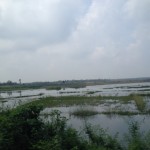
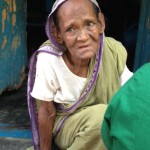
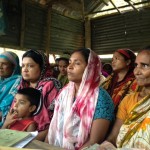
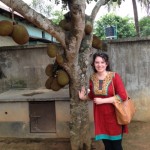
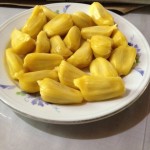

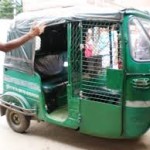
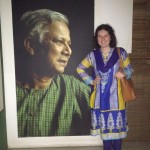
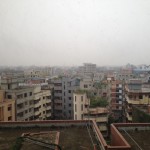

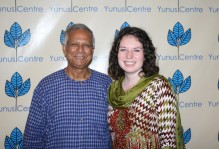

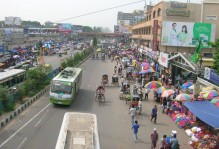
I am really enjoying reading about your journey. I understand your interests are in banking, but you are a talented writer! Keep up the blogging and safe travels.